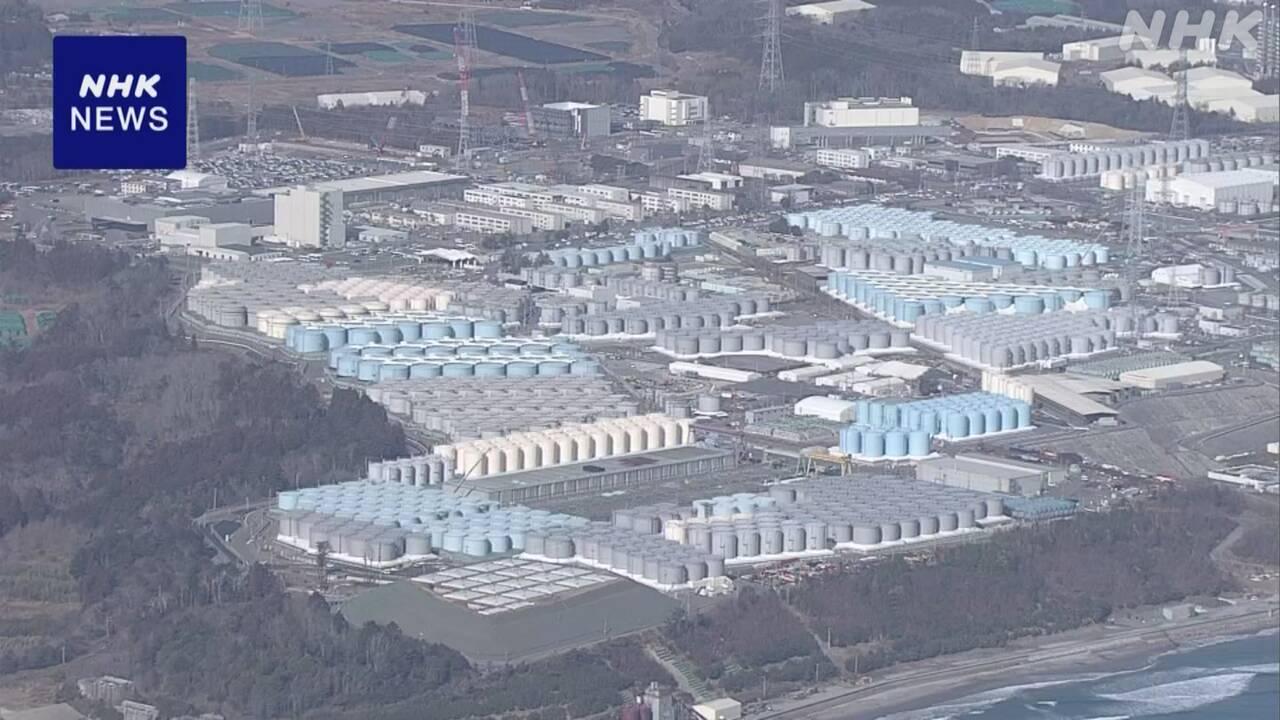24 days marks six months since the Fukushima Daiichi Nuclear Power Plant began releasing treated water into the ocean.
Three releases have been made so far, but the levels of tritium detected around the plant are well below TEPCO's voluntary standards.
On the other hand, troubles have been occurring one after another in the process of treating contaminated water, and local authorities and others have focused on TEPCO's safety management.
In addition, as China's suspension of imports of Japanese seafood products in response to the release of the products has been prolonged and the impact is growing, fisheries businesses are facing the challenge of securing alternative export destinations and new sales destinations to China.
At the Fukushima Daiichi Nuclear Power Plant, treated water containing radioactive substances such as tritium that remains after treating contaminated water is stored in more than 1,000 tanks, and TEPCO has been keeping the water below the standard since August 24 last year in accordance with government policy. After diluting it to a certain concentration, we began releasing it into the ocean.
So far, three releases have been carried out without any major problems, and a total of 23,351 tons from 30 tanks have been released.
TEPCO and the government are collecting seawater near the nuclear power plant and analyzing the concentration of tritium, but the highest value so far has been 22 becquerels per liter, and TEPCO has decided to voluntarily stop releasing tritium. This is far below the standard of 700 becquerels and the drinking water standard of 10,000 becquerels set by the World Health Organization.
In January, the International Atomic Energy Agency (IAEA), which verifies the safety of the project, released its first report since the start of the release, reconfirming that it complies with international safety standards. Did.
Next fiscal year, they plan to release 54,600 tons, the equivalent of about 50 tanks, in seven parts, and plan to begin dismantling the 20 or so empty tanks.
However, during the process of treating contaminated water, a worker was temporarily hospitalized after being exposed to waste fluid containing radioactive materials in October last year, and on February 7 this year, water containing radioactive materials leaked from a purification system. Troubles are occurring one after another.
The troubles caused by the continued release of treated water have drawn scrutiny from local governments such as Fukushima Prefecture, and TEPCO's safety management is once again being questioned.
Locals are experiencing problems with successive processing operations.
At the Fukushima Daiichi Nuclear Power Plant, a series of troubles have occurred over the past five months during the treatment of contaminated water, and local residents have voiced concerns and doubts.
In October 2023, a hose came off while cleaning pipes at a contaminated water treatment facility, spraying waste fluid containing radioactive materials on workers, and two men had contamination on their skin. I was hospitalized for a while.
In addition, on February 7, 2024, a worker at another purification system failed to notice that the valve of the piping inside the equipment was left open while passing water through it, causing water containing radioactive materials to be passed through. leaked outside.
At a meeting of the Nuclear Regulation Authority held on February 19th, Reiko Hachisuka, president of the Fukushima Prefecture Okuma Town Chamber of Commerce and Industry, who attended as a representative of local residents, said, ``We recognize that TEPCO has disappointed local residents.'' I would like them to do this.Despite the fact that there is attention and monitoring from all over the world regarding the release of treated water into the ocean, it is very unfortunate that a problem that could have been prevented had occurred if it had been confirmed.Tokyo Electric Power Co. is not serious about this issue. I would like you to show us, the citizens of the prefecture and the townspeople, what you can do. Please, please don't make us worry."
In addition, Seiichiro Tanaka, chairman of the Futaba Town Reconstruction Promotion Council, said, ``Troubles are occurring so frequently that we feel the need to dig deeper and think about improvement measures.The president himself has taken the lead in decommissioning the reactor. He said he wanted people to feel safe because they would move forward, but I don't feel like we're in that situation right now."
In response to these voices, Akira Ono, CEO of TEPCO's Fukushima Daiichi Decommissioning Promotion Company, said, ``I can't say that I understand the voices asking us not to worry.We will not know whether the situation will be safe and secure in the future.'' "It all depends on our efforts. We want to steadily advance the decommissioning work and build up a track record of safety."
Securing an export destination for marine products to replace China remains an issue
China's ban on imports of Japanese marine products, in reaction to the release of treated water into the ocean, is still in effect, even after six months.
Since September last year, seafood exports to China have been limited to non-edible items such as pearls and coral, and the value of seafood exports to China in the past year has decreased by 29% from the previous year.
In particular, scallops, which had a large proportion destined for China, decreased by 21.3 billion yen, or 43%, from the previous year.
TEPCO plans to compensate for price declines due to reputational damage and costs incurred in responding to overseas embargoes, and as of the 20th of this month, it has received approximately 260 compensation claims and has already received compensation. Approximately 40 cases were paid, totaling 4.2 billion yen.
The Japanese government has called on China to immediately abolish the restrictions, saying they are not based on scientific evidence, but there is no prospect of resuming exports.
As the impact continues to be prolonged, securing export destinations and new sales destinations to replace China has become an issue for seafood businesses, and the government is also supporting the development of new markets by inviting buyers from overseas. I'm doing it.

